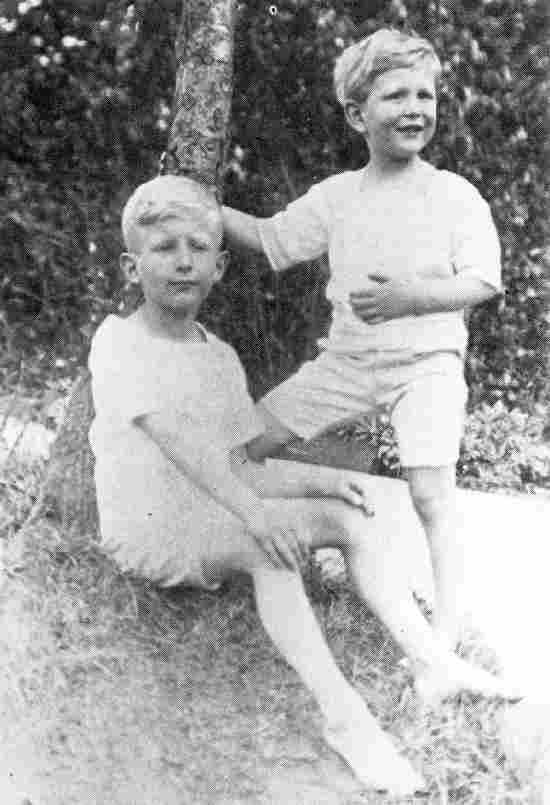
Figure 1.--This is Wystan and older brother John, probably about 1912-13. Notice the square cut shirts and the matching outfits.


Figure 1.--This is Wystan and older brother John, probably about 1912-13. Notice the square cut shirts and the matching outfits. |
Wystan Hugh Auden was a noted English poet. He was born in York during 1907. He attended prep school with Christopher Isherwood and they were close friends throughout theor lives. Auden was a committed anti-Fascist. He married Erika Mann, the daughter of noted German novelist Thomas Mann (1935). The marriage was a cover to enable Mann to escape NAZI Germany. There were no children. He was horrified by the Spanish Civil War and wrote a poem about it. Auden had a varied literary career. He wrote criticism and essays and co-authored a few plays with his prep school friend Isherwood. It is his poetry, however, on which his literary reputation rests. He wrote both traditional poetry as well as unstructured verse. He was influential in re-introducing Anglo-Saxon accentual meter to the main stream of English poetry.
Auden was associated with a group of writers including Edward Upward, Christopher Isherwood, and Stephen Spender. Auden moved to America as the World War II was beginning in Europe. Many British readers saw this a tantamount to dissertion (1939). Auden lived in America for many years and became a U.S. citizen. At the end of his life he returned to England and lived briefly in Oxford. He died in Vienna (1973).
Wystan's father was Dr. G.A. Auden. He was a noted scientist and physcician. He was the School Medical Officer in Birmingham. His mother ??? Bicknell was the youngest daughter of a vicar. As a boy, Wystan marveled at how two such different people could marry. [J. Auden, p. 27.] Dr. Auden was posted in several overseas locations (Egypt, Galipoli, and France) during the World War I. The boys were then in boarding schools. Their parents sold the family home in Solihull and their mother lived with family and friends.
There were three brothers: Wystan, John, and Bernard. Wystan was the youngest. John was the brother cloest to him, but was older by 3 years. He is the bother pictire with Wystan here (figure 1).
Wystan was born in York during 1907. The boys grew up in a prosperous middle-class family, but the arts and learning were stressed for all three boys. They loved the outdoors and ther parents took them on hiking and climbing outings in the country. Wystan developed an early interest in geology and learned to play the piano. He would play duets with his mother. All the Auden boys remember their parents as loving and thoughtful and their childhood as a happy time. It was clear to the whole family that although Wystan was the younger child that he was academically very gifted. Even when very young he could often preceive falty logic in adults and especially his brothers. He apparently was prone to correcting his olders brothers who acused him of "bumptious precocuty". [J. Auden, p. 25.] Having older brothers no doubt prepared him for boarding school.
The boys attended St. Edmund's Preparatory School which was a boarding school. He was there during much of World War I (1915-1920). Wystan got on well at school and was particularly attached to the headmaster's daughters who looked after the younger boys. A school mate looking back describes him as "clever and precocious" and aware of it. He also had a findely honed since of justice. [Smith, p. 35.] Wystan interesting at St Edmund's seemed more interested in science than literature. He was also very knowledeable in history, once giving the other boys an impromptu discourse on the late 14th century. He was not particularly interested in sports, very important at English boarding schools at the time. Even so he got on well and was well liked by the other boys. He showed continued interest in his music. It was at St. Edmund's that Wystan met Christopher Isherwood who also attended the school, but was 3 years older. It was later that they became close friends, a friendship that persisted throughout their lives. In his final year he was appointed Head Boy. After St. Edmuns's, Auben went on to Gresham's School, another boarding school.
Auden was a committed anti-Fascist. He was horrified by the Spanish Civil War and wrote a poem about it.
He married Erika Mann, the daughter of noted German novelist Thomas Mann (1935). The marriage was a cover to enable Mann to escape NAZI Germany. There were no children.
Wystan Hugh Auden was a noted English poet. Auden had a varied literary career. He wrote criticism and essays and co-authored a few plays with his prep school friend Isherwood. It is his poetry, however, on which his literary reputation rests. He wrote both traditional poetry as well as unstructured verse. He was influential in re-introducing Anglo-Saxon accentual meter to the main stream of English poetry. Auden was associated with a group of writers including Edward Upward, Christopher Isherwood, and Stephen Spender.
Auden moved to America as the World War II was beginning in Europe. Many British readers saw this a tantamount to dissertion (1939). Auden lived in America for many years and became a U.S. citizen.
At the end of his life he returned to England and lived briefly in Oxford. He died in Vienna (1973).
Auden, John. "A brother's viewpoint," in Stephen Spencer, ed. W.H. Auden: A Tribute (MacMillan: New York, 1975), 255p.
Smith, Harold Llewellyn. "At St. Edmund's 1915-1920," in Stephen Spencer, ed. W.H. Auden: A Tribute (MacMillan: New York, 1975), 255p.
Navigate the Boys' Historical Clothing Web Site:
[Introduction]
[Activities]
[Biographies]
[Chronology]
[Cloth and textiles]
[Clothing styles]
[Countries]
[Topics]
[Bibliographies]
[Contributions]
[FAQs]
[Glossaries]
[Satellite sites]
[Tools]
[Boys' Clothing Home]
